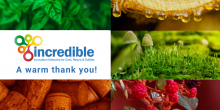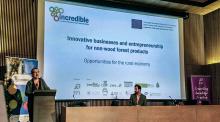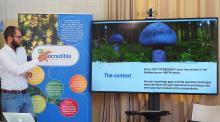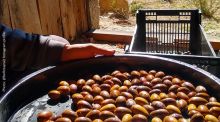Regulation required for Mediterranean mushrooms and truffles
What are the rules on collecting wild mushrooms and truffles in Europe? Representatives from Croatia, France, Greece, Italy and Spain compared notes on taxation and regulation from each of their countries and the message was resounding. With little or no supportive regulation in place, small businesses cannot thrive and even organised sale is deterred, giving rise to a black market or collection for personal use only. Realistic fiscal and labour regulation, as well as traceability legislation is urgently needed, for each country and at European scale.
These issues were thoroughly explored in an inter-regional workshop (organized by our partner Etifor) on mushrooms and truffles held in Padova, Italy, on 5 and 6 December, as part of the INCREDIBLE project which creates innovation networks for various wild forest products. In a meeting opened by Pietro Oieni of the Italian Ministry of Agriculture and Forest Policy (MIPAAFT) and with an introduction to the topic by Davide Pettenella of the University of Padova, the morning session explored national systems regulating mushroom and truffle collection, or the lack of them.
The afternoon was devoted to a round table on taxation and traceability of mushrooms and truffles in Italy, with a special focus on how modifications in the Italian law could be integrated into EU regulations. Mushrooms and truffles pickers’ associations, representatives of the Italian ministry responsible for food and forests, and researchers from universities participated in the discussion.
The following day, a field trip took more than 30 participants for a morning visit to poplar plantations managed by the truffle pickers’ association ‘Associazione Il Tartufo Bologna’ and, in the afternoon, to natural poplar groves along streams where white truffles (Tuber magnatum) are picked. Truffle picking is a highly regulated activity in Italy, and pickers must be registered in one of the many truffle associations in the country. Poplar plantations exist on marginal areas of crops in the Po Valley, some of them as rows of only one or two trees wide. The farmer remains the owner of the land by contract and receives a rent, while the truffle pickers’ association manages the plantations and reserves the right for its members, who pay an annual fixed fee, to harvest truffles. Most of the planted poplars, all the same clone, are not mycorrhized and take four to five years to produce truffles after planting. Mycorrhized poplar plants exist, but are very expensive. When the poplars reach commercial maturity, they are harvested and the timber value is reverted to the land owner or to the truffle pickers’ association depending on the contract.

ΣΧΕΤΙΚΑ ΜΕ ΤΟ ΠΡΟΓΡΑΜΜΑ
Το πρόγραμμα INCREdible στοχεύει στο να αναδείξει τρόπους με τους οποίους τα Μη Ξυλώδη Δασικά Προϊόντα (ΜΞΔΠ) μπορούν να παίξουν σημαντικό ρόλο στη στήριξη βιώσιμων πρακτικών διαχείρισης των δασικών πόρων, καθώς και στην ανάπτυξη αγροτικών περιοχών, με τον σχηματισμό δικτύων μέσα από τα οποία μεταδίδονται και ανταλλάσσονται πληροφορίες και εμπειρίες. Το πρόγραμμα "Δίκτυα καινοτομίας για τον Φελλό, το Ρετσίνι και Εδώδιμα προϊόντα της Μεσογειακής Λεκάνης" (INCREdible) προωθεί την διατομεακή συνεργασία και καινοτομία, με σκοπό να αναδείξει την αξία και τη δυναμική των ΜΞΔΠ στην περιοχή.
Funding
 ‘Το πρόγραμμα Δίκτυα καινοτομίας για τον φελλό, τις ρητίνες και τα εδώδιμα προϊόντα της Μεσογειακής λεκάνης (INCREdible) χρηματοδοτείται από το πρόγραμμα HORIZON 2020 της Ευρωπαϊκής Επιτροπής, στο πλαίσιο συμφωνίας επιχορήγησης Αρ. 774632.
‘Το πρόγραμμα Δίκτυα καινοτομίας για τον φελλό, τις ρητίνες και τα εδώδιμα προϊόντα της Μεσογειακής λεκάνης (INCREdible) χρηματοδοτείται από το πρόγραμμα HORIZON 2020 της Ευρωπαϊκής Επιτροπής, στο πλαίσιο συμφωνίας επιχορήγησης Αρ. 774632.
Contact
Email: info@incredibleforest.net or use the contact form.
We welcome your feedback!














